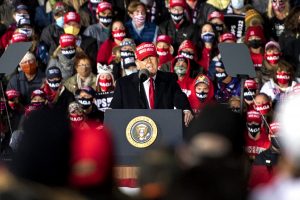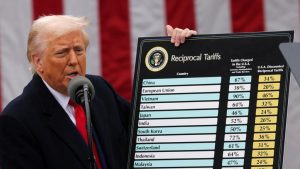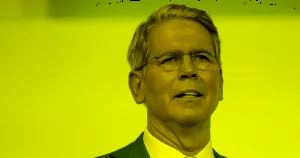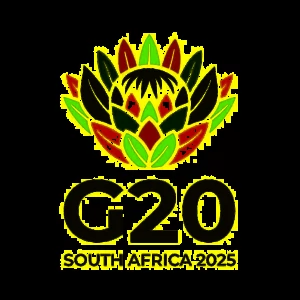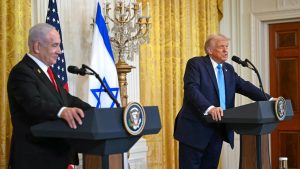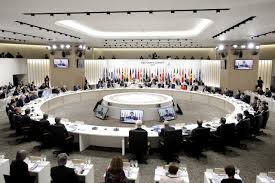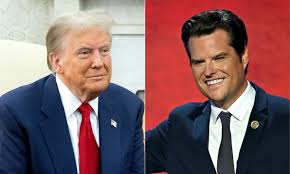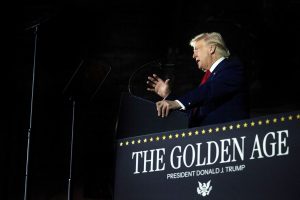
With the 100 days now reached, and just passed by Trump and his second administration, there is a desperate search to uncover a logic and goal or goals in Trump’s return to the White House and his most pointed policy action – the imposition of tariffs for all. I must say, it is not easy.
Now where to begin. I must say I am partial to David Brooks and his insights into Trump and his actions. And sure enough he gave us a view recently in the NYTimes in a piece entitled, ‘Trump’s Single Stroke of Brilliance”:
“Some of this is inherent in President Trump’s nature. He is not a learned man, but he is a spirited man, an assertive man. The ancient Greeks would say he possesses a torrential thumos, [passion] a burning core of anger, a lust for recognition. All his life, he has moved forward with new projects and attempted new conquests, despite repeated failures and bankruptcies that would have humbled a nonnarcissist.”
“Initiative depends on motivation. The Trump administration is driven by some of the most atavistic and powerful of all human desires: resentment, the desire for power, the desire for retribution.”
Well, I must say, the resentment is pretty evident. But it still leaves rather unclear the possible, if it can be found, a Trump strategic logic. Many opinion folk are trying. Though there are so many initial policy actions by way of Trump’s ‘Executive Orders’ – indeed it seems to be a record for an incoming President – actions against immigrants, especially deportation actions, universities, research initiatives, development assistance, and much much more. Still nothing seems to be more dramatic than Trump tariffs. And the search is on, just as it is elsewhere, for a logic for the dramatic global imposition of wide-ranging tariffs.
Peter Warr prepared a piece for the East Asia Forum (EAF) that attempts to crystallize, if possible, a Trump tariff policy logic. Warr is the John Crawford Professor of Agricultural Economics Emeritus at the Crawford School of Public Policy, The Australian National University (ANU) and Visiting Professor of Development Economics at the National Institute for Development Administration, Bangkok. Here is his first statement on the logic of Trump tariffs:
“He is imposing huge tariffs on the countries most vulnerable to them, then waiting to exploit the new position of strength to make demands. The uncertainty and fear they generate are not byproducts — they are the point, establishing the leverage Trump needs for the predatory negotiations that follow.”
So, it is about gaining leverage over allies and adversaries alike. As Warr suggests:
“The tariffs are surely harmful, even from a US perspective, but they are not ‘crazy’. Given the way Trump sees the world and himself, they almost make sense.”
But then it becomes clear that the actual tariff levels imposed are not particularly sensible:
“In his Rose Garden speech, Trump revealed supposed figures for ‘tariffs charged to the USA including currency manipulation and trade barriers’ and ‘USA discounted reciprocal tariffs’. The numbers mystified observers until analysts including James Surowiecki worked out that they reflected each country’s goods trade surplus with the United States as a percentage of their goods exports to the United States — with a minimum 10 per cent tariff imposed on all countries, even those with trade deficits.”
Now Warr, accepts that many analysts think the calculations from the administration are not sensible:
“As an estimate of protection rates against US goods, this calculation is absurd. Surowiecki called the formula ‘surprisingly silly’, and economist Paul Krugman called it ‘completely crazy’. But is it?”
So, Warr suggests there may in fact be a certain logic. The tariffs are designed, according to Warr to target those most vulnerable to Trump leverage:
“The critics missed the point that the formula attempts a rudimentary indication of countries’ vulnerability to US tariffs. Countries receiving the highest tariffs have the highest ratio of exports relative to imports from the United States, even if they have no restrictions against US goods, tariffs or otherwise.”
Though he attempts to highlight a certain logic – targeting what he sees as those with significant vulnerability to the US, in the end Warr has to concede that the approach is not exactly optimal:
“A better, but still approximate, measure of that vulnerability would have been gross exports to the United States divided by a country’s GDP, but that would produce much smaller tariffs, which presumably is why it was not used. This may also explain why services were excluded from the formula. The United States is a net importer of goods but a net exporter of services and it is much harder to levy tariffs on services than goods. Placing a country’s trade surplus with the United States in the numerator falsely suggests that the tariffs reduce the US trade deficit.”
“All these simplistic formulae still overlook the fact that countries have differing alternative, non-US export opportunities. They also ignore the effect of global value chains, with products crossing international borders multiple times during production. Reported trade balances misleadingly record the final assembly point as the source of US imports.”
Recognizing that the formula for tariffs is ‘simplistic’ Warr is left a bottom line that acknowledges only that Trump is a ‘protectionist’:
“Trump is a protectionist. He sees the decline of US manufacturing as foreigners stealing US jobs — grievance politics gone global. He thinks tariffs might reverse that.”
“Trump is a dealmaker. By ‘deal’ he means a zero-sum transaction in which one party wins at the expense of the other. Trump is obsessed with winning and believes tariffs can create coercive bargaining power for the United States as a major importer.”
“Trump’s deal-making strategy is now transparent. First, enact huge tariffs on the countries most vulnerable to the US. Then wait for their desperate leaders to call, pleading for special treatment. Then exploit the new position of strength to demand something he wants.”
It is not much of a strategic logic as Warr accepts in the end:
“This is the outlook Trump brings to trade policy. To respond most effectively to the tariffs, their function must first be recognised. The uncertainty and fear they produce is their essential purpose, establishing the bargaining power he requires for the predatory negotiations that follow.”
In fact I am more inclined to see Trump’s tariffs in the way described by Alan Beattie of the FT. Beattie was previously the FT’s international economy editor and world trade editor and these days he writes ‘Trade Secrets’.The title of his opinion says a lot: “Vision of a Trump master plan is fading in a storm of incoherence. As Beattie writes:
“The weeks and months since Donald Trump took office — in fact since he was elected — have seen companies, foreign governments, commentators and the media play the somewhat frustrating game of Hunt The Rationale.”
“They have watched a dizzying carousel of tariffs being threatened and then delayed, or imposed and then lifted, or imposed only to be shot through with loopholes.”
“Over time, the ranks of those claiming there’s a master plan have thinned — and their arguments have grown less persuasive. Increasingly it has become obvious that there is no plan, or at least no coherent plan with a single target and a way of hitting it. Instead, Trump’s tariff policy reflects a mixture of competing and often flat-out contradictory aims and a misunderstanding of the power of the crude instruments he is using.”
“All at once, he appears to be trying to cut trade deficits, protect US manufacturing, boost federal revenues, bring down other countries’ tariffs by offering deals, coerce them into a variety of actions (including allowing the US to annex Greenland or Canada), extract favours for granting exceptions to US companies, and keep the spotlight squarely on himself. The chaos surrounding his tariff policy is not just ineptitude — it is the result of huge contradictions.”
Now look it won’t stop analysts – both those determined to extract a logic and those likely not to, to keep examining the Trump policy action. Indeed I was attracted to the piece prepared by Stacie Goddard in Foreign Affairs (FA), “The Rise and Fall of Great-Power Competition: Trump’s New Spheres of Influence”. Now Goddard in the piece tackled the view that Trump’s strategic actions were driven by great power competition – a view adopted by many realist thinkers who see this as Trump’s logic focusing on US ‘interests’ in contrast to other administrations that have focused on ‘values’ and ‘collective global governance action’. As Goddard writes:
“But in the mid-2010s, a new consensus took hold. The era of cooperation was over, and U.S. strategy had to focus on Washington’s contests with its major rivals, China and Russia. The main priority of American foreign policy was clear: stay ahead of them.”
“Some hailed this consensus on great-power competition; others lamented it. But as Russia amped up its aggression in Ukraine, China made clear its designs on Taiwan, and the two autocratic powers deepened their ties and collaborated more closely with other U.S. rivals, few predicted that Washington would abandon competition as its guiding light. As Trump returned to the White House in 2025,many analysts expected continuity: a “Trump-Biden-Trump foreign policy,” as the title of an essay in Foreign Affairs described it.”
“Then came the first two months of Trump’s second term. With astonishing speed, Trump has shattered the consensus he helped create. Rather than compete with China and Russia, Trump now wants to work with them, seeking deals that, during his first term, would have seemed antithetical to U.S. interests.”
“These interpretations might have been persuasive in January. But it should now be clear that Trump’s vision of the world is not one of great-power competition but of great-power collusion: a “concert” system akin to the one that shaped Europe during the nineteenth century.”
“In Trump’s vision of a new concert, Russia and China must be treated as kindred spirits in quelling rampant disorder and worrisome social change. The United States will continue to compete with its peers, especially with China on issues of trade, but not at the expense of aiding the forces that Trump and his vice president, JD Vance, have called “enemies within”: illegal immigrants, Islamist terrorists, “woke” progressives, European-style socialists, and sexual minorities.”
Now digging back 200 years to describe a political order that might raise similarities to the actions of today’s Trump actions and others is intriguing but not strongly convincing. Leave aside the dangers of historical comparison, and there are many, the problem here is imposing strategic logic to a not very strategic actor. We’ve already seen it with his major initiative, tariffs. And, moreover, there is little to suggest that the other major actors accept and act in a concert-like manner. There is too much unilateral unconcert-like action.
But let’s keep our eye on Trump’s collaborative initiatives, if they are in fact there and determine whether great power collusion is in fact an operative framing for Trump 2.0 global order actions. Paint me skeptical.
Image Credit: NBC News
This Post first appeared at my Substack Alan’s Newsletter – https://globalsummitryproject.substack.com/publish/posts/detail/162614458/share-center

